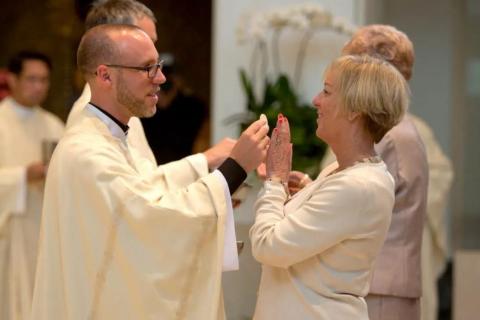
Photo from CITTA NUOVA
The term “self-esteem” was first coined by William James in 1890. In his original formula, self-esteem was made up of two elements: feeling good about ourselves (pretensions) and doing well (success).
The definition of pretension holds true as “a claim to dignity, importance, or merit.” The term “success” in James’ formula could also mean a sense of efficacy.
The search for personal self-esteem has been a popular focus of modern psychology since the late 1960s and became a “movement” in the 1980s.
The topic of self-esteem cannot, of course, be fully addressed in one article, so I will discuss it from the perspective of loving and being loved.
The second of the two great commandments states: “Love your neighbor as yourself” (Mt 12:31) and is repeated by Jesus to his disciples. The traditional meaning of this beautiful exhortation has been that we should love each person we meet with the same care and compassion that that we would want for ourselves (The Golden Rule).
My neighbor becomes part of me. I carry his burdens.
Understanding love of self
Over the last half century, the phrase “as you love yourself” has, in many instances, been explained in different ways.
In the secular world, many therapists are fond of saying that it is necessary to “love oneself” first. Only then will we be able to build healthy relationships. From pulpits we may hear the advice that one should love oneself first so as to be able to love one’s neighbor.
Of course, we have to accept ourselves and make sure that we are not caring for others in a way that we neglect our own basic needs.
However, I want to suggest a different interpretation, considering that love is not only a feeling, but also an action (and for that reason, we need to distinguish it from self-care and self-acceptance, which are needed to live a balanced life).
Is it possible to be a giver and a receiver of the same action? How can we love ourselves? Is it not the case that love flows out of individuals toward others, through concrete moments of service or affection?
Learning to love
When my son Christopher was a young child, he often had difficulty sleeping throughout the night. Unlike his siblings, he would call out for me, rather than his mother. When this first occurred, I awoke feeling rather confused, as I was certain he had singled me out in error.
Therefore, with mild feelings of guilt, I woke up his mother who immediately rushed to take care of our little guy. However, he became agitated and kept calling for Daddy. (When this first happened, I wondered briefly how his mother had managed to teach him to call me during the night!)
I was feeling exhausted this particular night and really did not have any energy or love to direct toward my son. I was tempted to take care of my own needs, which seemed quite valid at the time and to let Maureen calm Christopher down. Of course, this wasn’t an option. I got out of bed and stumbled down the hall to attend to my son.
Feeling some fatigue and frustration, I took care of his diaper situation and offered some words of comfort and hurried back to bed. A few moments later, Christopher called me again, and I realized that he may have sensed that I hadn’t fully loved him but had just gone through the motions.
I got out of bed a second time and decided that I had to lay aside my negative feelings and willfully love my son. I spoke to him gently and comforted him as best I could. This time he peacefully settled under his covers, feeling my love… and not my upset.
I realized that my little son had taught me how to love, regardless of my current emotional state — something his mother already knew and practiced regularly! I was able to love, even though I didn’t feel like it. I fell back to sleep, at peace.
Need for growth
What I have found useful in the development of self-esteem and confidence is to focus on self-awareness. To start the process, it is useful to make a list of personal strengths and challenges. This should be done with the assistance of a good friend, who may see things about us that we ourselves cannot see.
Through awareness of our challenges, we can acknowledge the need for growth or change in particular facets of our life. Making this happen can be very productive for one’s concept of self and confidence.
We are all a work in progress, and the desire for change and its evolution occur best within the context of relationship. We can learn how to balance commitments and expectations and to give ourselves a chance to succeed. We can learn how to be objective about many forms of social media that project artificial versions of happiness and fulfillment, which can lead to feelings of discouragement.
It may be the case that, because of insurmountable challenges or historical emotional wounds, a visit with a therapist or counsellor may be warranted.
Awareness of strengths can be a confidence builder, as we are then more able to reach out in relationship to others and share our God-given talents. We are built and wired for relationship, and our God is in himself relationship — a triune God!
Giving and receiving
Self-awareness can include making time to be quiet and to listen to what the Holy Spirit may be nudging us to do. Openness to God’s will is a wonderful way to live the life we are meant to live, which will lead to peace and joy. God is love, and so the best way to serve is to imitate God and love those around us at any given moment.
I make it a habit to smile and greet those who serve me at store checkout counters or in restaurants. I reach out to them before they have the opportunity to give me their standard greeting. Invariably this simple gesture is well received and generates a positive response, a brief genuine connection.
We are called to love and care for our neighbors in the same way that we would care for ourselves. We are also invited to be open to love directed toward us from others. When I love selflessly (with no agenda) I receive the hundredfold, a reality of peace and joy. When I am the recipient of unconditional love, the effects are similar.
Pope Paul VI mentioned on occasion that the “family is the cell of society” and, within families, adults are the heart of that cell. When spouses are too self-focused, and prioritize their own needs, they invariably have challenges in their relationship. Marriages may end because of prolonged power struggles.
If, however, married partners have a strong commitment to loving each other, a strong family cell can develop. If a parent is on their own, strong reciprocal relationships can still be developed with friends, in addition to the relationships built with their own children.
Married friendship may require an adjusted “Golden Rule” and as a result, may help increase the self-esteem (self-awareness) of each spouse. We know that we are to “do unto others as we want done unto ourselves” (see Lk 6:31), but in marriage it should be interpreted slightly differently as: love your spouse (friend) the way she/he wants to be loved. We naturally tend to love our spouse the way we like to be loved and it may not be what they desire at all. Healthy self-esteem would seem to be a fruit of loving others and receiving love from others.
And perhaps its pursuit can be compared to an attempt to catch a butterfly. No matter how hard we try, it remains elusive. However, after we have forgotten about it and busied ourselves loving our neighbors… we may discover that the butterfly has landed on our arm!












